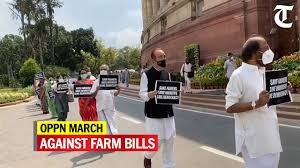NEW DELHI: Ahead of the 5 pm meeting of the opposition delegation with President Ram Nath Kovind on Wednesday, the MPs of Congress and like-minded parties took out a protest march on the Parliament premises to protest against the passage of “anti-farmer and anti-labour bills” in the “absence of discussions”.
“All MPs of the Congress and like-minded parties are marching from Gandhi statue to Ambedkar statue in Parliament protesting against the anti-farmer, anti-worker Bills that have been rubberstamped in Parliament in the most undemocratic manner by the Modi government,” party chief whip Jairam Ramesh said.
The opposition leaders are boycotting Parliament proceedings and have laid down conditions for return to the Houses. The conditions include a stand-alone bill guaranteeing MSP for farmers’ produce and an assurance that such MSP would be applicable to private trade as well.
The opposition MPs earlier on Wednesday met and signed another memorandum to be submitted to the President. The memorandum alleges that the government is riding roughshod in Parliament and pushing bills without any semblance of debate or discussion.
Jairam Ramesh also slammed the passage by Parliament of the Essential Commodities Amendment Bill, 2020, saying, “Amendment passed to the Essential Commodities Act, 1955, erodes constitutional rights of states. It’s a highly centralising Act and will be rendered ineffective when the nation goes through a time of crisis.”
Explaining the reasons for the Congress opposition to the Bill, Ramesh said, “There are two clauses. Under clause (a), supply may be regulated only in the case of war, famine, extraordinary price rise or natural calamity of a grave nature. Under clause (b), stock limits may be imposed only if certain price levels are triggered. The manner of reckoning or calculating the ‘stock limits’ attracts the first proviso and the explanation. Reading the two together, it appears that the stock can be cleverly distributed among different value chain participants and, in practical terms, there will be no case of violating stock limits at all.”
Ramesh said there could also be some states where menace of hoarding is so rampant that the state government may wish to regulate and place stock limits.
“Hence, respecting the principle of federalism, the Amendments must apply only if the state government, by notification, applies the Amendment Act in that state. It gives an opportunity for the hoarders and black-marketeers for speculation.
In such a diverse country as ours where the situation may differ from district to district within a state such a centralised law would make it very difficult for the states to check black-marketing of goods,” said the Congress chief whip in Rajya Sabha.


